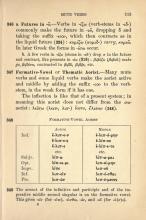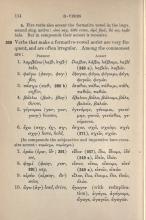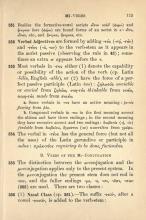347. Many mute verbs and some liquid verbs make the aorist active and middle by adding the suffix -ο:ε- to the verb stem, in the weak form if it has one.
The inflection is like that of a present system; in meaning this aorist does not differ from the σα- aorist.
λείπω (λειπ, λιπ-) leave, ἔλιπον
348. Formative-Vowel Aorist
|
Active |
Middle |
|
|
Ind. |
ἔ-λιπ-ο-ν |
ἐ-λιπ-ό-μην |
|
Subj. |
λίπ-ω |
λίπ-ω-μαι |
|
Opt. |
λίπ-οι-μι |
λιπ-οί-μην |
|
Imperat. |
λίπε |
λιπ-οῦ |
|
Inf. |
λιπ-εῖν |
λιπ-έ-σθαι |
|
Part. |
λιπ-ών |
λιπ-ό-μενος |
349. The accent of the infinitive and participle and of the imperative middle second singular is on the formative vowel. This gives -εῖν (for -έ-εν), -έ-σθαι, -ών, and -οῦ (for -έ-(σ)ο).
a. Five verbs also accent the formative vowel in the imperative 2nd singular active.
εἰπέ say
ἐλθέ come
εὑρέ find
ἰδέ see
λαβέ take
But in compounds their accent is recessive.
350. Verbs that make a formative-vowel aorist are very frequent, and are often irregular. Among the commonest are:
|
Present Ind. |
Aorist |
|||||
|
Ind. |
Subj. |
Opt. |
Impv. |
Inf. |
Part. |
|
|
λαμβάνω take |
ἔλαβον |
λάβω |
λάβοιμι |
λαβέ (§ 349.a) |
λαβεῖν |
λαβών |
|
φεύγω flee |
ἔφυγον |
φύγω |
φύγοιμι |
φύγε |
φυγεῖν |
φυγών |
|
πάσχω suffer |
ἔπαθον |
πάθω |
πάθοιμι |
πάθε |
παθεῖν |
παθών |
|
βάλλω throw |
ἔβαλον |
βάλω |
βάλοιμι |
βάλε |
βαλεῖν |
βαλών |
|
γίγνομαι become |
ἐγενόμην |
γένωμαι |
γενοίμην |
γενοῦ |
γενέσθαι |
γενόμενος |
|
ἔχω have, hold |
ἔσχον |
σχῶ |
σχοίην |
σχές (§ 271) |
σχεῖν |
σχών |
(In compounds the subjunctive and imperative have recessive accent: παράσχω, παράσχες.)
|
Present Ind. |
Aorist |
|||||
|
Ind. |
Subj. |
Opt. |
Impv. |
Inf. |
Part. |
|
|
ὁράω see |
εἶδον (§ 267) |
ἴδω |
ἴδοιμι |
ἰδέ (§ 349.a) |
ἰδεῖν |
ἰδών |
|
φημί say |
εἶπον |
εἴπω |
εἴποιμι |
εἰπέ (§ 349.a) |
εἰπεῖν |
εἰπών |
|
αἱρέω seize |
εἷλον |
ἕλω |
ἕλοιμι |
ἕλε |
ἑλεῖν |
ἑλών |
|
ἤγαγον |
ἀγάγω |
ἀγάγοιμι |
ἄγαγε |
ἀγαγεῖν |
ἀγαγών |
|
351. Besides the formative-vowel aorists εἴπον (said, φημί) and ἦνεγκον (bore, φέρω) are found forms of an aorist in -α.
εἶπα, εἶπας, etc.
ἤνεγκα, ἤνεγκας, etc.



